| Listing 1 - 10 of 20 | << page >> |
Sort by
|
Book
ISBN: 1800109946 Year: 2023 Publisher: Rochester, New York : Camden House,
Abstract | Keywords | Export | Availability | Bookmark
 Loading...
Loading...Choose an application
- Reference Manager
- EndNote
- RefWorks (Direct export to RefWorks)
Shows how Adler, Wander, Hilsenrath, and Klüger intertwine transgressive political criticism with the shadow of trauma, revealing new perspectives on canon formation and exclusion in postwar German literature.
German literature --- Holocaust survivors' writings, German --- Autobiography --- German prose literature --- Jewish authors --- History and criticism.
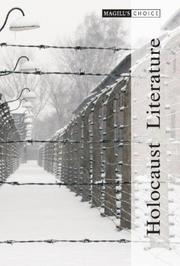
ISBN: 1587654431 9781587654435 9781587653759 1587653753 9781587653766 1587653761 9781587653773 158765377X Year: 2008 Publisher: Pasadena, Calif. Salem Press
Abstract | Keywords | Export | Availability | Bookmark
 Loading...
Loading...Choose an application
- Reference Manager
- EndNote
- RefWorks (Direct export to RefWorks)
Holocaust Literature identifies the most important works on the Holocaust, by both first- and second-generation survivors as well as philosophers, novelists, poets, and playwrights reflecting on the Holocaust today. Reviews of the classics of Holocaust literature are arranged alphabetically by title and include histories, biographies, memoirs, diaries, testimonials, eyewitness accounts, philosophy, social criticism, novels, short fiction, poetry, and plays.
Book
ISBN: 9782753582934 2753582939 Year: 2022 Publisher: Rennes Presses universitaires de Rennes
Abstract | Keywords | Export | Availability | Bookmark
 Loading...
Loading...Choose an application
- Reference Manager
- EndNote
- RefWorks (Direct export to RefWorks)
Les survivants des camps nazis, dans leur grande majorité, n'ont été ni lus ni écoutés à l'époque de leur retour. Or de la centaine de récits de témoignage parus en France et en Italie au sortir de la Seconde Guerre mondiale, ceux que l'on connaît aujourd'hui se comptent probablement sur les doigts d'une main. Cet ouvrage nous replonge dans la période de l'immédiat après-guerre pour redonner une voix à ces rescapés qui ont écrit leurs souvenirs à chaud sous le coup d'une irrépressible pulsion de témoigner. Allant au-delà d'une simple constatation de l'indicible apparenté trop souvent à l'± impossibilité de dire ?, l'on découvre ainsi une multiplicité remarquable de techniques linguistiques et littéraires mises en œuvre par les survivants pour transmettre une part de leur vécu concentrationnaire à leurs lecteurs. Il s'agit d'une étude essentielle sur les divers moyens d'expression d'une expérience de l'extrême, alors que nous entrons, au XXIe siècle, dans une nouvelle ère de bouleversements politiques.
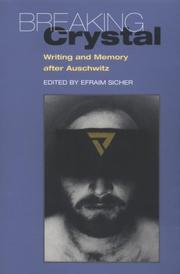
ISBN: 0252066561 0252022807 Year: 1998 Publisher: Urbana (Ill.) : University of Illinois press,
Abstract | Keywords | Export | Availability | Bookmark
 Loading...
Loading...Choose an application
- Reference Manager
- EndNote
- RefWorks (Direct export to RefWorks)
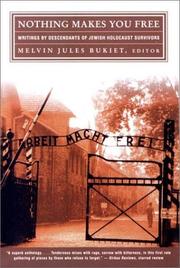
ISBN: 0393324257 Year: 2003 Publisher: New York : W. W. Norton,
Abstract | Keywords | Export | Availability | Bookmark
 Loading...
Loading...Choose an application
- Reference Manager
- EndNote
- RefWorks (Direct export to RefWorks)
Book
ISBN: 9043503495 9789043503495 Year: 2001 Publisher: Kampen Kok
Abstract | Keywords | Export | Availability | Bookmark
 Loading...
Loading...Choose an application
- Reference Manager
- EndNote
- RefWorks (Direct export to RefWorks)
Holocaust survivors' writings --- Ex-concentration camp inmates --- Suffering --- Holocaust, Jewish (1939-1945) --- Holocaust (Jewish theology) --- Religion --- Psychology --- Religious aspects --- Judaism --- History and criticism
Book
ISBN: 9782753597587 2753597588 Year: 2024 Publisher: Presses universitaires de Rennes
Abstract | Keywords | Export | Availability | Bookmark
 Loading...
Loading...Choose an application
- Reference Manager
- EndNote
- RefWorks (Direct export to RefWorks)
"Comment lire les récits de vie déposés au centre d'archives (CDJC) du Mémorial de la Shoah à Paris? La question est ici abordée par une double analyse dont les deux aspects suivants sont mêlés: 1) l'analyse de ces récits eux-mêmes en nouant les approches linguistiques, littéraires, historiques qui rendent compte, ensemble, du fonctionnement du genre testimonial par rapport au lieu de production, de diffusion et de réception dans lequel il s'inscrit; 2) l'analyse de l'espace institutionnel qui conserve et met à disposition ces récits aux multiples fonctions, heuristique, pédagogique, esthétique et éthique. Initialement écrits dans l'intimité des familles, ces textes changent en effet de statut lorsqu'ils sont déposés dans un centre d'archives comme celui du Mémorial. Cette institution leur confère une visibilité potentielle et elle offre aux scripteurs la possibilité de se réclamer d'une appartenance collective. Elle engendre donc un surcroît de significations tant pratiques que théoriques que l'ouvrage tente de démêler."--
Holocaust survivors' writings, French --- Holocaust, Jewish (1939-1945) --- Holocaust memorials --- History and criticism. --- Personal narratives --- Historiography. --- Mémorial de la Shoah --- Archives.
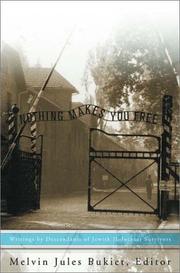
ISBN: 0393050467 Year: 2002 Publisher: New York (N.Y.) : Norton,
Abstract | Keywords | Export | Availability | Bookmark
 Loading...
Loading...Choose an application
- Reference Manager
- EndNote
- RefWorks (Direct export to RefWorks)
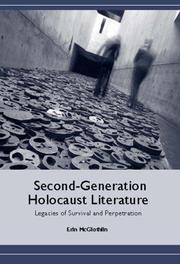
ISBN: 1571133526 9781571133526 9781571136855 9786611949532 1281949531 1571136851 Year: 2006 Publisher: Suffolk Boydell & Brewer
Abstract | Keywords | Export | Availability | Bookmark
 Loading...
Loading...Choose an application
- Reference Manager
- EndNote
- RefWorks (Direct export to RefWorks)
Among historical events of the 20th century, the Holocaust is unrivaled as the subject of both scholarly and literary writing. Literary responses include not only thousands of autobiographical and fictional texts written by survivors, but also, more recently, works by writers who are not survivors but nevertheless feel compelled to write about the Holocaust. Writers from what is known as the 'second generation' have produced texts that express their feeling of being powerfully marked by events of which they have had no direct experience. This book expands the commonly-used definition of 'second-generation literature,' which refers to texts written from the perspective of the children of survivors, to include texts written from the point of view of the children of Nazi perpetrators. With its innovative focus on the literary legacy of both groups, it investigates how second-generation writers employ similar tropes of stigmatization to express their troubled relationships to their parents' histories. Through readings of nine American, German, and French literary texts, Erin McGlothlin demonstrates how an anxiety with signification is manifested in the very structure of second-generation literature, revealing the extent to which the literary texts themselves are marked by the continuing aftershocks of the Holocaust. Erin McGlothlin is assistant professor of German at Washington University in St. Louis.
Children of Holocaust survivors, Writings of. --- Children of Nazis, Writings of. --- German literature --- Holocaust, Jewish (1939-1945), in literature. --- History and criticism. --- Children of Holocaust survivors, Writings of --- Children of Nazis, Writings of --- Writings of children of Nazis --- Literature --- Writings of children of Holocaust survivors --- Holocaust. --- legacy. --- second-generation literature. --- stigmatization.
Book
ISBN: 1108658563 1108563759 1108684882 1108472826 Year: 2018 Publisher: Cambridge : Cambridge University Press,
Abstract | Keywords | Export | Availability | Bookmark
 Loading...
Loading...Choose an application
- Reference Manager
- EndNote
- RefWorks (Direct export to RefWorks)
This important study examines women's life writing about the Second World War and the Holocaust, such as memoirs, diaries, docunovels, and autobiographically inspired fiction. Through a historical and literary study of the complex relationship between gender, genocide, and female agency, the analyzes correct androcentric views of the Second World War and seek to further our understanding of a group that, although crucial to the functioning of the National Socialist regime, has often been overlooked: that of the complicit bystander. Chapters on army auxiliaries, nurses, female refugees, rape victims, and Holocaust survivors analyze women's motivations for enlisting in the National Socialist cause, as well as for their continuing support for the regime and, in some cases, their growing estrangement from it. The readings allow insights into the nature of complicity itself, the emergence of violence in civil society, and the possibility of social justice.
World War, 1939-1945 --- Women --- Holocaust survivors' writings, German --- National socialism and women. --- Women and national socialism --- German Holocaust survivors' writings --- German literature --- Human females --- Wimmin --- Woman --- Womon --- Womyn --- Females --- Human beings --- Femininity --- German --- History --- Participation, Female. --- History and criticism. --- Germany --- Social life and customs.
| Listing 1 - 10 of 20 | << page >> |
Sort by
|

 Search
Search Feedback
Feedback About UniCat
About UniCat  Help
Help News
News